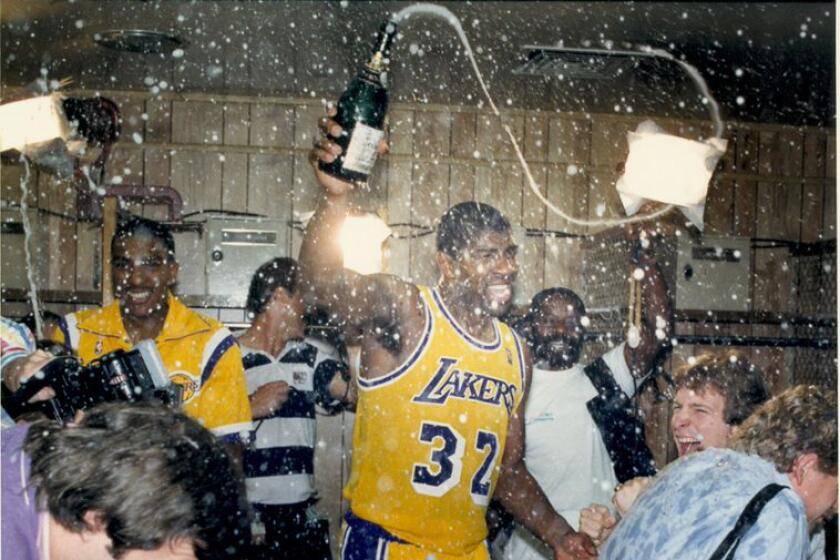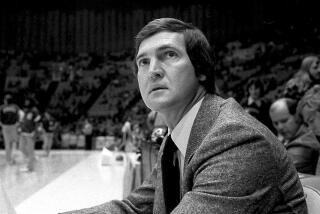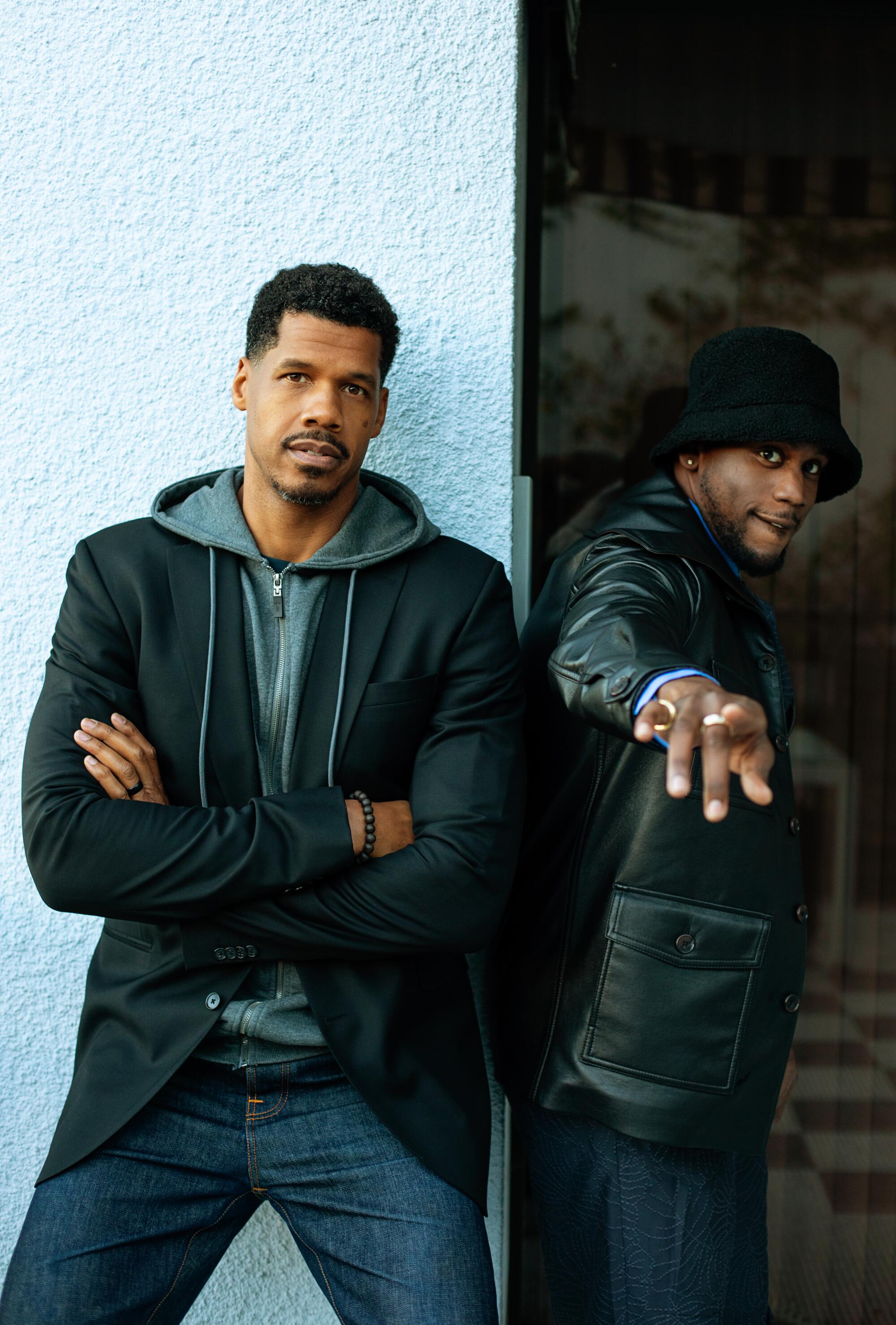
When NBA legend Michael Jordan reminisced about his remarkable career and final championship season with the Chicago Bulls in 2020’s “The Last Dance,” viewers turned up in droves, making the ESPN docuseries an instant smash.
For the record:
11:20 a.m. March 2, 2022An earlier version of this story mischaracterized Solomon Hughes’ affiliation with Stanford University. He is no longer a lecturer there.
HBO is hoping to score a similar victory with a strikingly different story of basketball greatness, one that could easily be subtitled “Flashdance.” “Winning Time: The Rise of the Lakers Dynasty” stars a veteran team of top-tier performers and a pair of screen rookies portraying NBA legends Magic Johnson and Kareem Abdul-Jabbar.
Set at the start of the “Showtime” era of the 1980s Los Angeles Lakers, the series, which premieres Sunday, depicts how the team, with an assist from the fresh-faced rookie Johnson and the dominant but moody Abdul-Jabbar, realized owner Jerry Buss’ revolutionary vision of mixing muscular athleticism with noisy, sexy entertainment, transforming the franchise into a dazzling powerhouse with worldwide popularity.
Behind HBO’s ‘Winning Time’: The real story of Magic Johnson, Jerry Buss and the 1980s Lakers, and how they changed the NBA and America.
Like “The Last Dance,” “Winning Time” is filled with strong, colorful personalities; intense locker room drama; memorable allusions to pop culture; and the pressurized frenzy of sporting fame.
But against its predecessor’s relatively straightforward documentary approach, anchored by talking-head interviews with the key players, “Winning Time” is an extensively researched, rollicking tale of flash, cash and clashes, filled with outrageous situations likely to make viewers wonder, “Did that really happen that way?” It’s the latest from executive producer Adam McKay, who also directed the pilot and injects the series with the irreverent flavor of his previous projects, with family drama to rival “Succession” and stylistic touches reminiscent of his films “The Big Short,” “Vice” and “Don’t Look Up.”
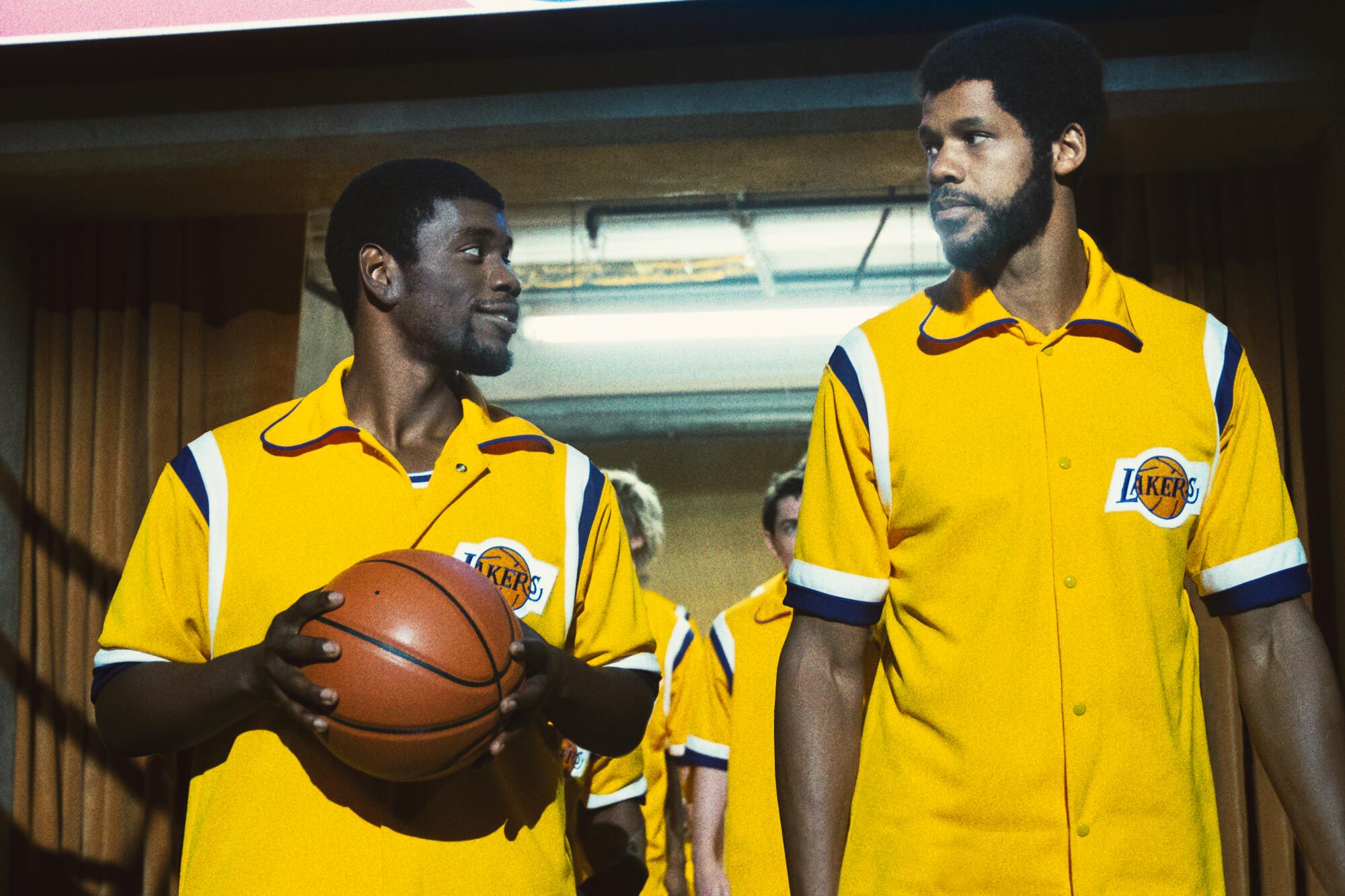
“We want everyone to have a blast watching this,” said showrunner and executive producer Max Borenstein, who co-created the series with executive producer Jim Hecht. “It’s a show about how basketball changed culture. This moment in American history changed the NBA and influenced our culture on a global scale.”
Added executive producer Rodney Barnes: “At its core, this is about the creation of entertainment and show around basketball. People will get a better idea of the business of basketball, plus the behind-the-scenes stuff you didn’t know, along with the things you did know.”
“Winning Time” kicks off a flood of forthcoming TV projects celebrating the Lakers, who are currently struggling though a low-octane season of uninspired play and relentless scrutiny of management decisions. Current owner and president Jeanie Buss (daughter of Jerry) and filmmaker Antoine Fuqua (“Training Day”) are developing a nine-part documentary series exploring the team’s history during the last four decades for Hulu. And Johnson will be the subject of his own four-part docuseries, “They Call Me Magic,” scheduled to premiere in April on Apple TV+.
But these authorized endeavors are not likely to have the salacious edge or freewheeling energy of “Winning Time.” Characters break the fourth wall, commenting on the action and winking at the audience. Onscreen captions identify characters, often with unflattering descriptions. The dialogue is crammed with expletives.
ESPN and Netflix co-production “The Last Dance” features intimate, never-before-seen footage of Michael Jordan’s final winning season with the Bulls.
Some viewers may be startled by some of the excessive behavior, Barnes acknowledged. “Anytime you do some kind of rendition of a team or players or individuals, there are many facets. There is the public persona, the persona within the game, and then you have aspects of who a person may be, based upon the research that we’ve done.”
He added, “I think it’s a fully realized portrait. No human being is one particular thing. We don’t do anything in ‘Winning Time’ that is disparaging, or at least that’s not the intent. This is done out of love and appreciation for the Lakers and the game itself.”
The star-studded cast includes John C. Reilly as Lakers owner and man-about-town Jerry Buss; Jason Clarke as Laker legend Jerry West; Adrien Brody as coach Pat Riley; Jason Segel as his Shakespeare-quoting colleague Paul Westhead; Sally Field as Jerry’s mother, Jessie Buss; and Hadley Robinson as young Jeanie.
Occupying the center of the action are newcomers Quincy Isaiah and Solomon Hughes, who play Johnson and Abdul-Jabbar, respectively. Both have minimal acting experience: Isaiah, who like Johnson hails from Michigan, has had a few minor roles. Hughes, a former college basketball player and Harlem Globetrotter who earned a doctorate in higher education from the University of Georgia and lectured at Stanford University’s School of Higher Education, is making his professional acting debut.
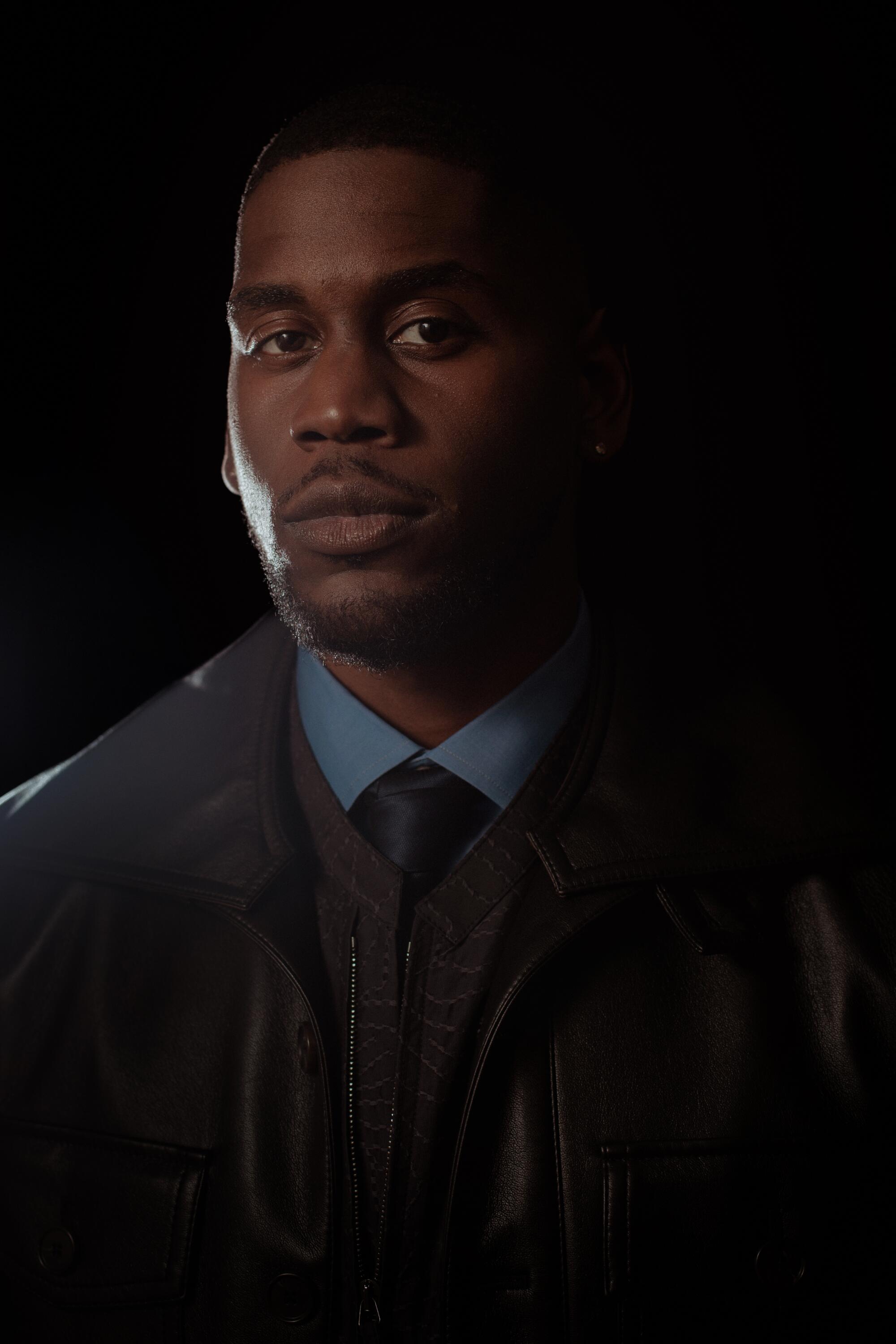
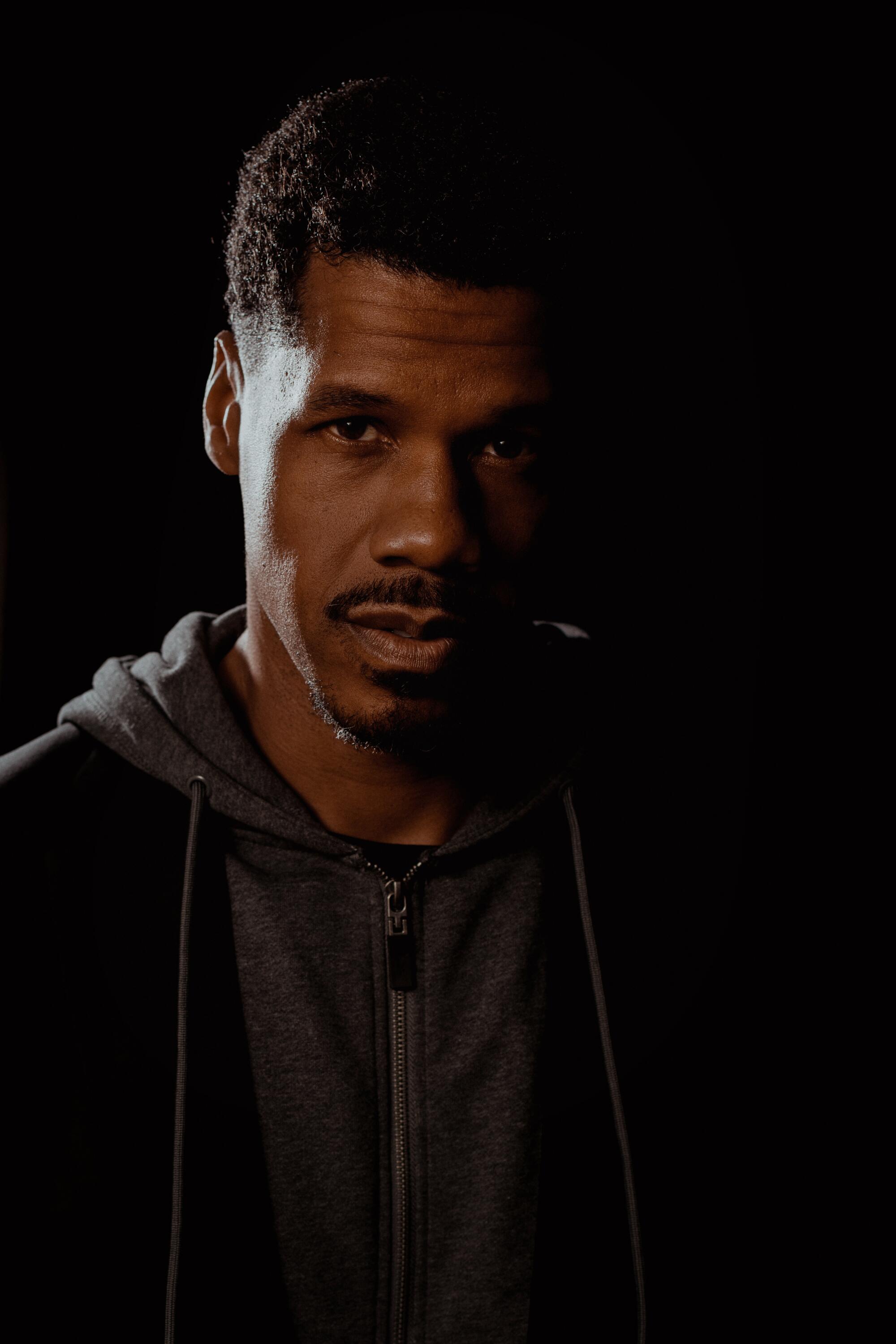
And aside from the massive Lakers fan base devoted to all things purple and gold, Isaiah and Hughes may be the two people most excited for “Winning Time.”
“I was a Shaq fan, so naturally I loved the Lakers,” Isaiah said with a huge smile during a recent joint Zoom interview with Hughes.
“Since I was a kid, I’ve been a Kareem kid,” the latter piped in. “His autobiography ‘Giant Steps,’ along with ‘The Autobiography of Malcolm X,’ were some of the first books I ever read. To play someone that I’ve admired my whole life is just surreal.”
The first chapters of “Winning Time” chronicle the tension that arises between the two stars after Johnson is drafted by the Lakers in 1979. The no-nonsense Abdul-Jabbar, who loves jazz and is deeply dedicated to his Muslim faith and to Black culture, had little patience for most people, including his teammates — and at first, the upbeat, eager-to-please rookie was no exception. But they soon evolved into a phenomenal force on the court, and close friends off it.
“Kareem isn’t sure how he feels about the game, and then this young kid comes in and breathes life into the organization and gives it new wings,” Hughes said.
Stepping into the high-top sneakers of superstars was a challenge for both actors, neither of whom consulted with his character’s real-life counterpart. It was particularly difficult to portray moments that illustrated Johnson’s and Abdul-Jabbar’s frailties.
“It’s tough, I’m not going to lie,” Isaiah said. “You’re playing someone who is beloved, a hero. It’s tough to see that the people you look up to are human. But it’s also helpful. It shows that they’re not that different from you. You can mess up, make mistakes and still come out on top.”
He added, “You don’t do a show like this without a deep admiration and love for what they did and who they are. I just hope the people see that — that these people are human but also extraordinary.”
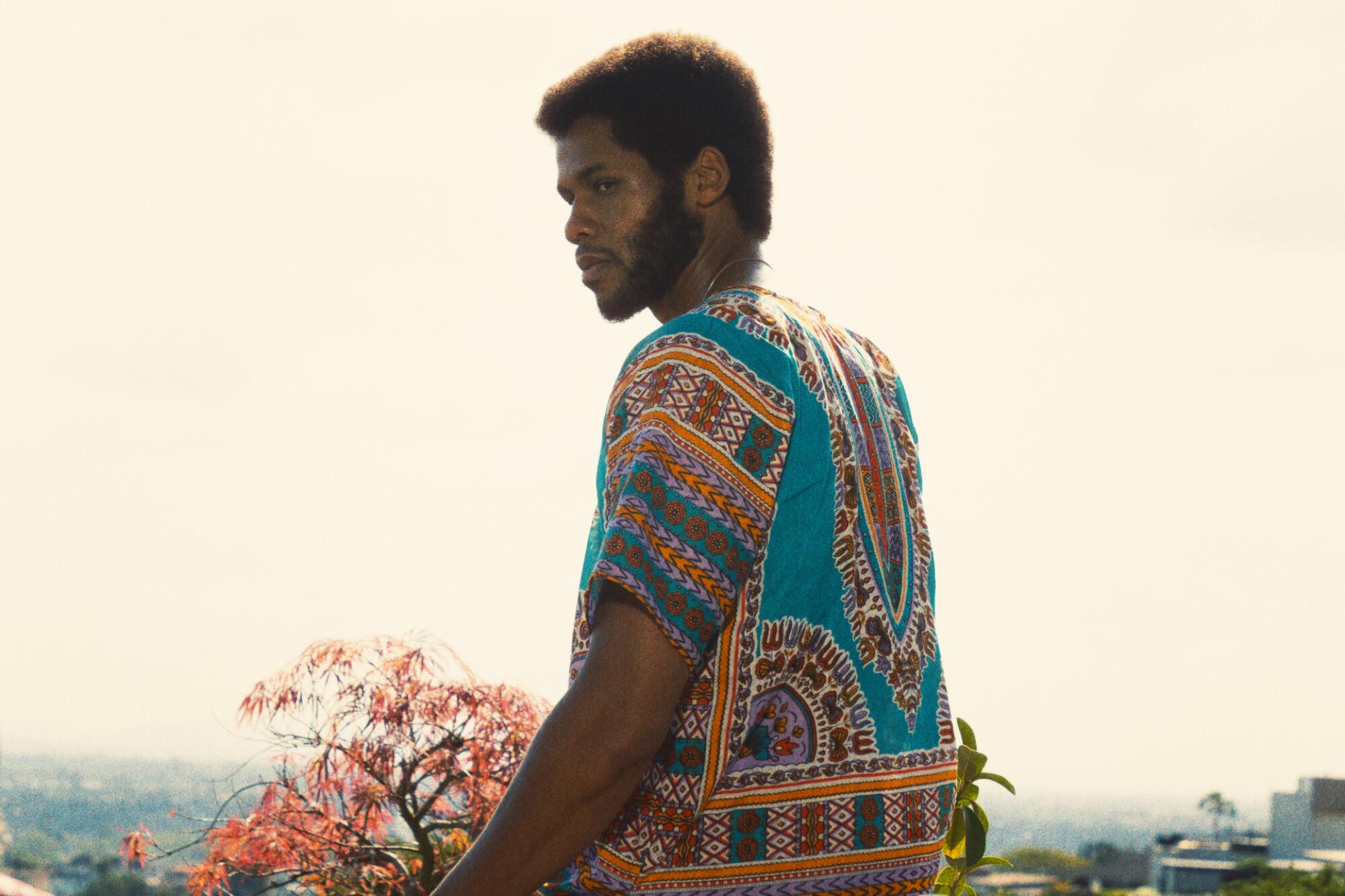
“There is definitely fear and trepidation in playing these guys,” Hughes added. “But I don’t take for granted the opportunity to honor these men, to tell their story and show what they built, the coming together of sports and entertainment. These were the two players at the center of making that happen.”
Borenstein and Barnes were ecstatic about Isaiah’ and Hughes’ performances. Both actors were cast after a long and arduous nationwide search, in which hundreds of actors were considered, overseen by casting director Francine Maisler.
“Not only did we have to find actors who could pull [off] the likeness of Magic and Kareem and reasonably play basketball but we needed actors who could embody those unique and very different characteristics,” Borenstein said. “Magic has this extraordinary charisma and charm — the kind of movie-star charisma that even movie stars don’t have — while Kareem has this gravitas, this intellectual weight.”
“The casting gods smiled down on us,” Barnes added. “Quincy is from Michigan, so there’s already this understanding of who Magic is as a person. And he is a big personality — he looks like Magic and has that million-dollar smile. Solomon has that intellectual conviction and a big heart. Plus, they got along. Their dynamic is much like what I imagine Magic and Kareem are in real life. They were able to go from having very little acting experience to totally carrying that storyline.”
The complete guide to home viewing
Get Screen Gab for everything about the TV shows and streaming movies everyone’s talking about.
You may occasionally receive promotional content from the Los Angeles Times.
Isaiah and Hughes grew close during the grueling production process, which combined acting with physical training and basketball practice at the main set — a regulation-size basketball court built inside a huge soundstage at downtown’s Los Angeles Center Studios.
Their friendship and affection for each other was palpable during the interview.
“My life has changed because of Quincy,” Hughes said, looking fondly at his co-star. “I can’t imagine having to embark on this journey without him. He breathes life into the room.”
Isaiah responded with another smile. “I always joke that Solomon is the adult in the room and I get to be the kid. He would send me encouraging messages telling me I’m a leader. I really needed to hear that. That was huge. I don’t think he knows how much that meant to me. This is my friend, my brother.”
They both hope that viewers enjoy the project. But Isaiah also has a message for viewers who recognize him after “Winning Time” airs.
“I just want to say this — this is TV,” he said. “I don’t want anyone to come up to me challenging me to a game of one-on-one.”
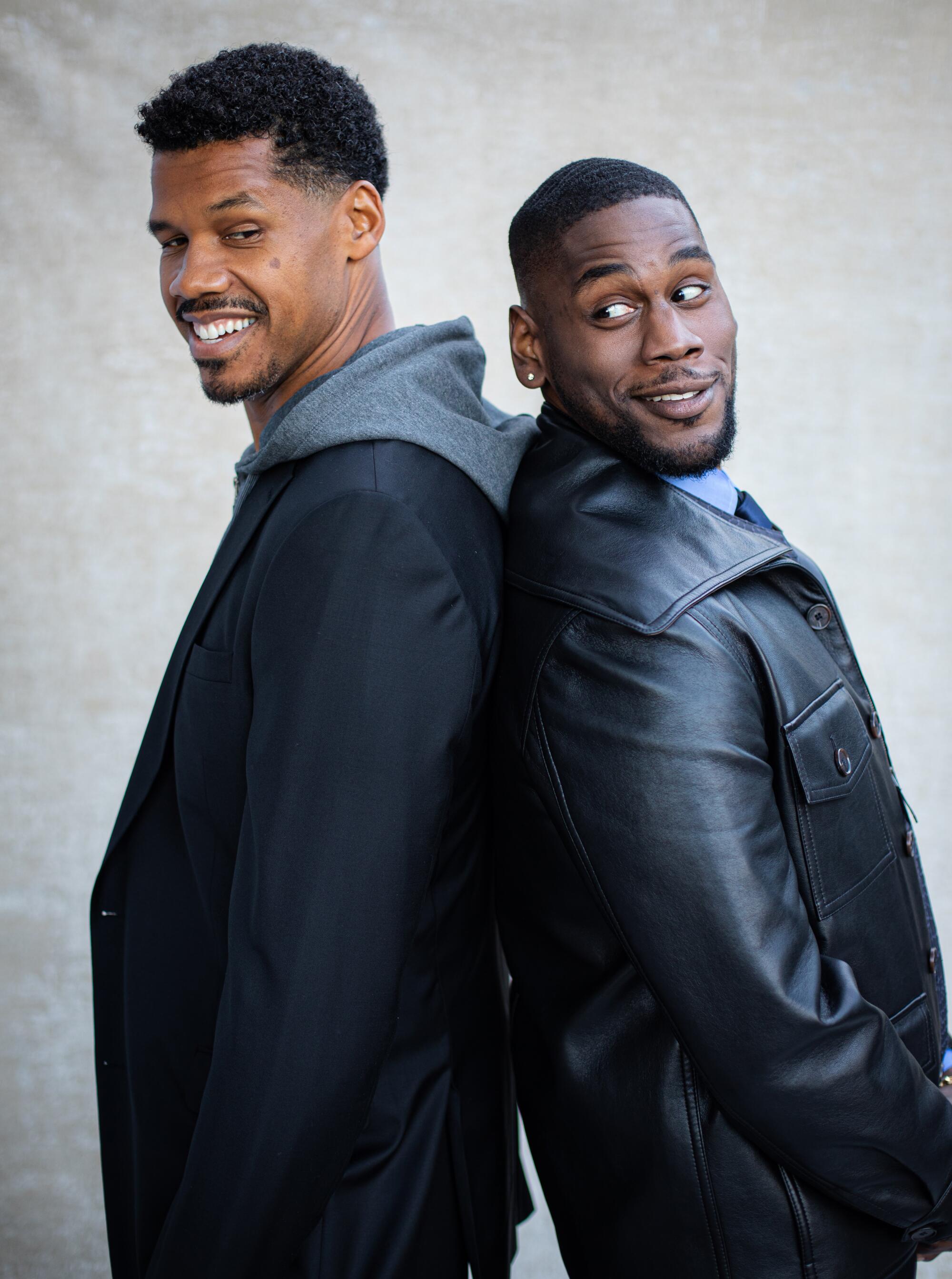
‘Winning Time: The Rise of the Lakers Dynasty’
Where: HBO
When: 9 p.m. Sunday, March 6
Rating: TV-MA (may be unsuitable for children under the age of 17)
More to Read
The complete guide to home viewing
Get Screen Gab for everything about the TV shows and streaming movies everyone’s talking about.
You may occasionally receive promotional content from the Los Angeles Times.
